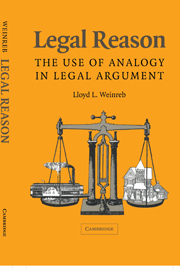Book contents
- Frontmatter
- Contents
- Preface
- Introduction
- 1 Analogy and Inductive and Deductive Reasoning
- 2 Steamboats, Broadcast Transmissions, and Electronic Eavesdropping
- 3 Analogical Legal Reasoning
- 4 Analogical Reasoning, Legal Education, and the Law
- Appendix A Note on Analogical Reasoning
- Appendix B Biographical Notes
- Notes
- Index
2 - Steamboats, Broadcast Transmissions, and Electronic Eavesdropping
Published online by Cambridge University Press: 05 June 2012
- Frontmatter
- Contents
- Preface
- Introduction
- 1 Analogy and Inductive and Deductive Reasoning
- 2 Steamboats, Broadcast Transmissions, and Electronic Eavesdropping
- 3 Analogical Legal Reasoning
- 4 Analogical Reasoning, Legal Education, and the Law
- Appendix A Note on Analogical Reasoning
- Appendix B Biographical Notes
- Notes
- Index
Summary
Common law: Adams v. New Jersey Steamboat Co.
Adams was a passenger on the defendant's steamboat, going from New York to Albany. During the night, having locked the door and fastened the windows of his stateroom, he left a sum of money in his clothing. The money was stolen by someone who apparently managed to reach through one of the windows. Adams sued to recover the amount of his loss. The jury returned a verdict for Adams, and judgment was entered in his favor. On appeal, the judgment was affirmed, and the defendant took a further appeal to the New York Court of Appeals.
The only question before the court was whether the trial court had properly instructed the jury that, in the circumstances, the defendant was liable as an insurer, without proof that it had been negligent. In its opinion, having stated the issue, the court turned without further elaboration to the rule that innkeepers were liable as insurers for the losses of their guests. The rule, the court said, was based on public policy: innkeepers should have a “high degree of responsibility” because of the “extraordinary confidence … necessarily reposed in them” and the “great temptation to fraud and danger of plunder” created by “the peculiar relations of the parties.” The relations of a steamboat operator to its passengers, the court went on, “differ in no essential respect”: “[t]he passenger procures and pays for his room for the same reasons that a guest at an inn does,” and “[t]here are the same opportunities for fraud and plunder” that tempt an innkeeper.
- Type
- Chapter
- Information
- Legal ReasonThe Use of Analogy in Legal Argument, pp. 41 - 64Publisher: Cambridge University PressPrint publication year: 2005

